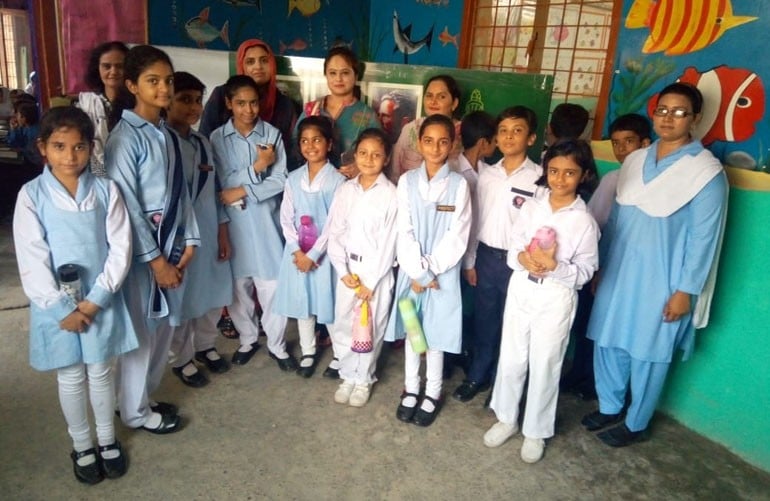
Rubina Shakeel’s NGO has pioneered running makeshift schools with funds generated from the daily collection and sale of trash

Lahore, a city of more than 11 million, produces 7,200 tonnes of waste every day, while there is only one company -- Lahore Waste Management Company (LWMC) -- that is supposed to dispose of the piles of garbage. In this context, Aabroo Educational Welfare Organisation, an NGO, has pioneered running a set of makeshift schools with the funds generated from the daily collection and sale of trash.
Founded by Lahore-based philanthropist Rubina Shakeel, Aabroo (which translates as respect) is funding the education, food and medicines of over 5,000 underprivileged and orphaned children who are studying in these schools.
The organisation collects up to 21 tonnes of waste from around 8,000 houses in various parts of the city, sorting plastic bottles and reusable items from the rubbish. The collected items are then sold to a local recycling market, which brings Rs 1.72 million (approx.) a month, sufficient for 40 percent expenses of the schools.
Currently, Aabroo boasts three Aabroo Welfare High Schools that offer day as well as evening classes for 1,532 children including, a secondary school on Atta Bakhsh Road. Their head office is located on Hudiara Drain, the city’s largest open sewer.
Children attending these schools, from nursery to intermediate, are not only provided free education and vocational training but also medical assistance, freshly cooked food at lunch hours, books, stationery, uniforms, and toys.
Currently, over 300 young girls are receiving training in stitching and sewing from instructors at three different facilities. The staff consists of 150 teachers, 45 administrative staff members, and more than 50 volunteers.
Shakeel tells TNS that she hails from a poor background. "A few elders in the neighborhood helped me and my younger siblings continue at school. I had the same idea when I found felt I could help the underprivileged children."
She says that she started by teaching five children of her housemaid "in our car porch." The number grew over time: "Within 40 or so days, the number of my students rose to 65!"
Shakeel says that she understood that free midday meal along with free schooling was going to be attractive for parents of the children. This laid the foundation of the Aabroo Educational Welfare Organisation in 2003.
Today, food for the students is prepared the kitchen at each school. The schools also have cattle farms to provide milk for the children.
What’s more, technical and vocational training (TVT) is also provided to the students. It’s compulsory, she adds. "The children can choose from a variety of fields, including tailoring, dress design, electronics repair and maintenance, cooking, or working at call centres."
Shakeel is convinced that the students must receive technical education. "A skill is what is going to make them productive citizens of the society when they pass out from the school," she says.
A large warehouse for collecting garbage was set up next to the Aabroo head office. Bags are distributed to some 8,000 families for putting solid garbage in. these bags are then collected by Aabroo teams and transported to the warehouse.
"At the warehouse, our teams segregate wood, clothes, books, and decorative items," says the administrator of Aabroo warehouse, Zahid Qureshi. "We all kinds of plastic, bottles, glass, cooking utensils, electronic items, and paper to the recycling companies registered with the Punjab government."
The collected pieces of clothing are utilised to stitch eco-friendly shopping bags that can be sold in the market. Nothing of the waste is a waste for us, everything is being reused to educate, feed, and provide shelter to the needy kids. This makes us proud."
Environmentalist Asif Ali Sial is of the view that the collection and utilisation of residential waste is setting a great example.
"LWMC’s per-day capacity to collect garbage is perhaps not more than 6,000 tones, so the rest of the waste is an opportunity for the informal sector," he says.
According to some estimates, this informal economy is worth more than a billion rupees annually.
Aabroo needs to raise Rs3.7 million a month to meet its running costs. Apart from earning from waste, the organisation offers an adopt-a-child programme wherein people are invited to contribute Rs1,000 per child every month. According to the management, till now more than 1,600 students have been adopted.
An Aabroo orphanage for 200 children is under construction.